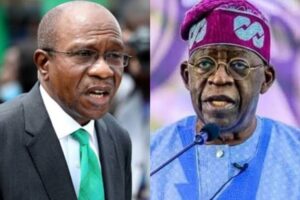Mr Godwin Emefiele, Governor of the Central Bank of Nigeria, has been suspended by President Bola Tinubu with immediate effect.
This is sequel to the ongoing investigation of his office and the planned reforms in the financial sector of the economy, according to a statement on Friday by the Director of Information, Office of the Secretary to the Government of the Federation, Willie Bassey.
According to the statement, Emefiele has been directed to immediately hand over the affairs of his office to the Deputy Governor (Operations Directorate), who will act as the CBN governor pending the conclusion of the investigation and the reforms.
The CBN listed the Deputy Director, Operations Directorate, as Mr Folashodun Adebisi Shonubi.
Unconfirmed reports emerged late on Friday that operatives of the Department of State Services had arrested the suspended CBN governor.
A top security source, who spoke on condition of anonymity, said that Emefiele would have been arrested during the administration of former President Muhammadu Buhari.
He said, “Yes, expect that (his arrest) to happen. He would have been arrested before but the administration of former President Buhari protected him. He has many questions to answer.
“As a result of this, he won’t be allowed to either travel out or sneak out of the country. So, we are looking for him.”
Emefiele, who was appointed the apex bank’s governor on June 4, 2014, was also at the centre of a storm in January 2023 when security operatives attempted to arrest him over allegations of terrorism financing and economic crime.
Section 11 of the CBN Act, 2007 gives the President power to terminate the appointment of the apex bank governor, but such must have the backing of lawmakers.
“The CBN governor can be removed by the President provided that the removal of the governor shall be supported by two-thirds majority of the Senate praying that he be removed,” the section stated.
The Act also states that the governor, deputy governor, or director of the CBN can be removed if they are serving as a lawmaker or a director of a bank.
“A person shall not remain a governor, deputy governor or director of the Bank if he is a member of any federal or state legislative house; or if he is a director, officer or employee of any bank licensed under the Banks and Other Financial Institutions Act.”
The CBN Act further states that criminal offences and mental health conditions can result in the CBN governor’s termination of appointment.
“The governor, deputy governor or director shall cease to hold office in the Bank if he becomes of unsound mind or, owing to ill health, is incapable of carrying out his duties: is convicted of any criminal offence by a court of competent jurisdiction except for traffic offences or contempt proceedings arising in connection with the execution or intended execution of any power or duty conferred under this Act or the Banks and Other Financial Institutions Act,” the Act adds.
The governor can also be removed if he “is guilty of a serious misconduct in relation to his duties under this Act; disqualified or suspended from practising his profession in Nigeria by order of a competent authority made in respect of him personally; becomes bankrupt.”
The introduction of the naira redesign policy by the Emefiele-led CBN in October 2022 started on a controversial note as the then Minister Finance, Budget and National Planning, Zainab Ahmed, kicked against it barely 48 hours after it was announced.
Ahmed had stated that her ministry was not consulted and she was not aware of the monetary policy.
The reaction generated tension and uncertainty until the Presidency confirmed that Buhari approved the policy, which it said was to manage inflation, combat currency counterfeiting and ransom payment.
Early January 2023, the CBN started a cash swap programme in various local government areas to reach citizens in rural communities, who complained of the unavailability of banks in their localities.
The initial deadline of January 31, 2023, set by the apex bank for the old notes to cease being legal tender was moved to February 10, as the country fell into hard times with both the old and new naira notes going out of circulation.
The situation was compounded by fuel scarcity across the country as Nigerians berated the policies of the government as ill-thought.






